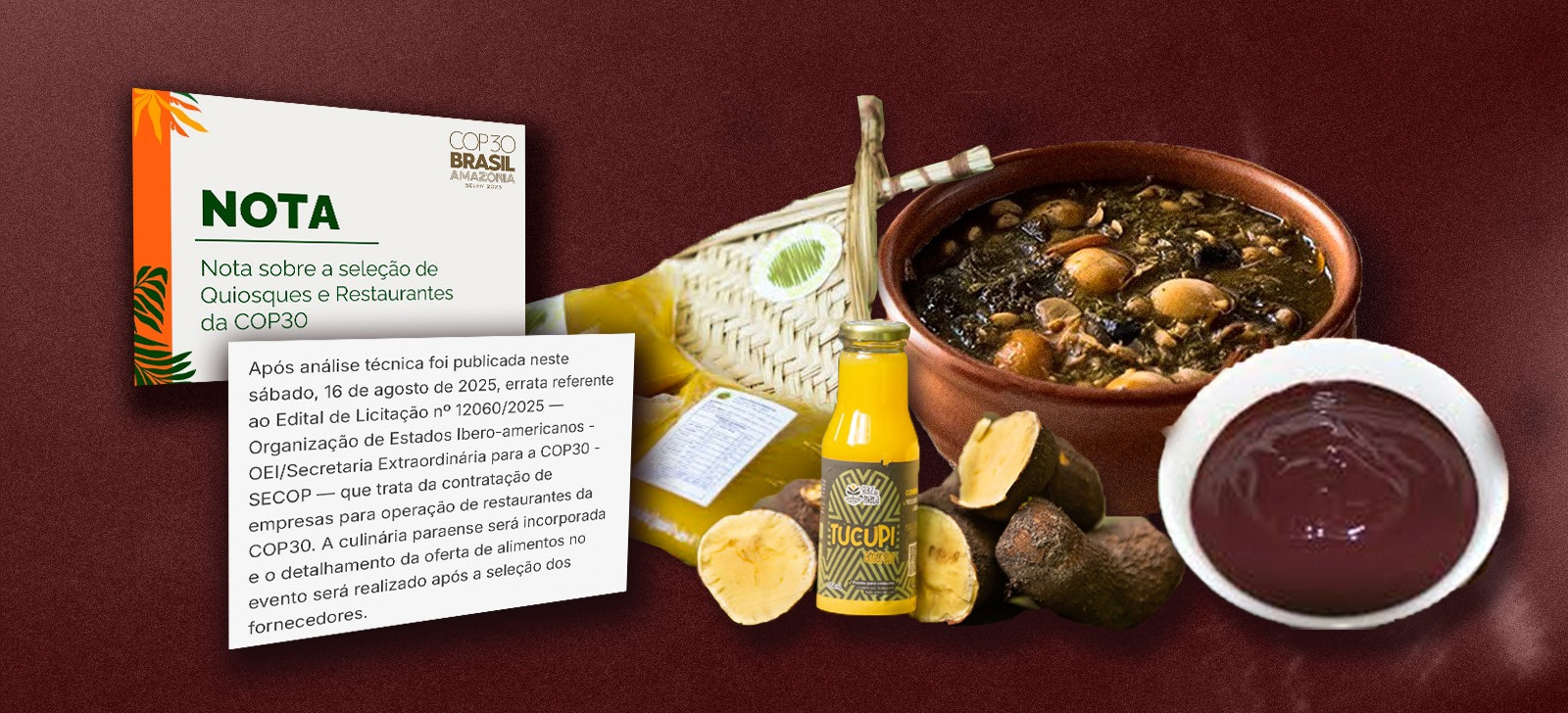COP30 backtracks and allows sale of traditional Amazonian dishes at the event
18 de August de 2025

By Lucas Thiago – From Cenarium
MANAUS (AM) – The Organization of Ibero-American States (OEI) lifted, this Saturday, the 16th, the ban on selling three traditional Amazonian dishes: açaí, tucupi and maniçoba, in official areas of the 30th United Nations Climate Change Conference (COP30). The authorization was published in a statement on the event’s website.
The OEI issued an erratum regarding Bidding Notice No. 12060/2025 — Organization of Ibero-American States – OEI/Extraordinary Secretariat for COP30 – SECOP — concerning the contracting of companies to operate COP30 restaurants, which had previously banned the sale of these foods citing “high risk of contamination.”
According to the statement, after technical review, “Pará’s cuisine will be incorporated, and details on the food offerings at the event will be provided after the selection of suppliers.”
The reversal comes after remarks by Tourism Minister Celso Sabino, who stated on social media that the OEI was wrong to try to “ban” açaí from being part of COP30’s gastronomic menu. The minister said the document would be reissued to include the natural product of Belém, the host city of this year’s event.
“The other day they tried to take from Belém the title of capital of brega music. Now, they wanted to exclude our açaí from COP. Hold on, not here,” wrote the minister when posting his video, ending it with a regional expression.
In the video, the minister asserts that the organization made a serious mistake by banning sales of traditional products. “They made a mistake; they made a grave error by blocking one of the main products of Pará’s gastronomy,” said Sabino in the recording.
Food items such as raw oysters, mayonnaise, undercooked meats and fresh fruit juices remain prohibited. The event will take place in Belém, the capital of Pará, from November 10 to 21 of this year.
Understanding the case
The Organization of Ibero-American States (OEI) released a notice earlier this week banning traditional Amazonian products during COP30, scheduled to take place from November 10 to 21 of this year.
The OEI is responsible for contracting services for the first climate event in the Amazon, through an agreement with the federal government. The entity stated that the foods on the list posed some type of risk. Also included were mayonnaise, raw oysters, undercooked meats and fresh fruit juices, according to the newspaper O Globo.

The document stated that the fruit carries a “risk of contamination by Trypanosoma cruzi (the causative agent of Chagas disease), if not pasteurized.” Thus, all types of açaí had been prohibited at the conference. Regarding tucupi and maniçoba, the OEI claimed that both could “contain natural toxins if not properly prepared.”
Both maniçoba and tucupi contain hydrocyanic acid, a toxic compound that may pose health risks. To make them safe for consumption, a long preparation process is required: in the case of maniçoba, cassava leaves must be ground and cooked for approximately seven days. Tucupi, on the other hand, undergoes fermentation and boiling processes that help neutralize or eliminate the substance.

“The list of foods presented must be strictly followed in the preparation of menus. Failure to comply with this requirement may result in requests for item replacement,” read a passage from the notice.
The document also required each restaurant category to follow specific rules in preparing menus. According to the OEI, at least six culinary styles were defined: International VIP, Brazilian/Regional VIP, Italian, Vegan/Vegetarian, Pan-American and Brazilian/Regional.

International VIP-standard restaurants were required to represent at least four continents, valuing original techniques and seasonings combined with modern presentation. Meanwhile, establishments focused on Pan-American cuisine had to encompass the cuisines of North, Central and South America, prioritizing typical ingredients such as corn, cassava, quinoa, cocoa and tropical fruits.
Prohibited items
- Açaí – carries risk of contamination by Trypanosoma cruzi, the parasite that transmits Chagas disease.
- Tucupi and maniçoba – according to the notice, may contain natural toxins if not properly prepared.
- Raw oysters and undercooked meats – pose risk of virus and bacteria transmission.

